Deutsche Staatsoper Berlin, season 2022/2023
“DER FLIEGENDE HOLLÄNDER”(The Flying Dutchman)
Romantic Opera in three acts
Libretto and music by Richard Wagner
The Dutchman GERALD FINLEY
Daland, a Norwegian sea captain JAN MARTINÍK
Senta, his daughter VIDA MIKNEVICIUTE
Erik, a huntsman STANISLAS DE BARBEYRAC
Mary, Senta’s nurse MARINA PRUDENSKAYA
Daland’s steersman MAGNUS DIETRICH
Staatsopernchor
Staatskapelle Berlin
Conductor Matthias Pintscher
Chorus Martin Wright
Production Philipp Stölzl
Stage Philipp Stölzl, Conrad Moritz Reinhardt
Costumes Ursula Kudrna
Light Hermann Münzer
Berlin, 21st May 2023
Philipp Stölzl’s production of The Flying Dutchman by Richard Wagner has been on show at the Deutsche Staatsoper Berlin for ten years, originally a take-over from the Theater Basel and later reprised at the Gran Teatre del Liceu in Barcelona. It has undoubtedly proved successful, which I wanted to assure myself of in a repertoire performance recently. 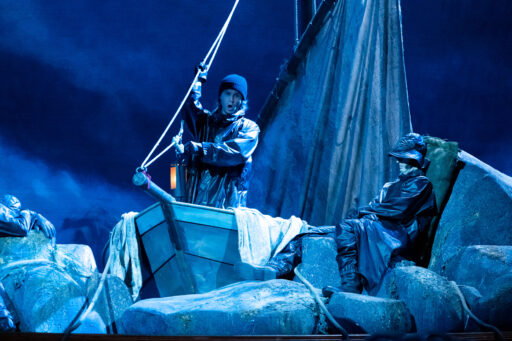 The idea of neurotic dreams of a young woman is not new. The East-German opera director Harry Kupfer used it for his Bayreuth production as early as in 1978. Stölz’s Senta appears as a young girl who is obsessively reading in the weighty tome about the Flying Dutchman in Daland’s mansion designed by Stölzl himself and Conrad Moritz Reinhardt. There is a huge painting of a stormy sea on the back wall which opens up for the scenes of the ships and crews which turn into a kind of Pirates-of-the-Caribbean show when the Dutchman’s sailors appear like zombies (costumes by Ursula Kudrna). The second act starts with the housemaids doing some cleaning rather than spinning, supervised by the governess Mary. The young girl is hiding with the book under a big table with a down-to-bottom cloth on it to re-appear as the mature Senta who sings the ballad of the Flying Dutchman, the musical linchpin of the opera.
The idea of neurotic dreams of a young woman is not new. The East-German opera director Harry Kupfer used it for his Bayreuth production as early as in 1978. Stölz’s Senta appears as a young girl who is obsessively reading in the weighty tome about the Flying Dutchman in Daland’s mansion designed by Stölzl himself and Conrad Moritz Reinhardt. There is a huge painting of a stormy sea on the back wall which opens up for the scenes of the ships and crews which turn into a kind of Pirates-of-the-Caribbean show when the Dutchman’s sailors appear like zombies (costumes by Ursula Kudrna). The second act starts with the housemaids doing some cleaning rather than spinning, supervised by the governess Mary. The young girl is hiding with the book under a big table with a down-to-bottom cloth on it to re-appear as the mature Senta who sings the ballad of the Flying Dutchman, the musical linchpin of the opera. 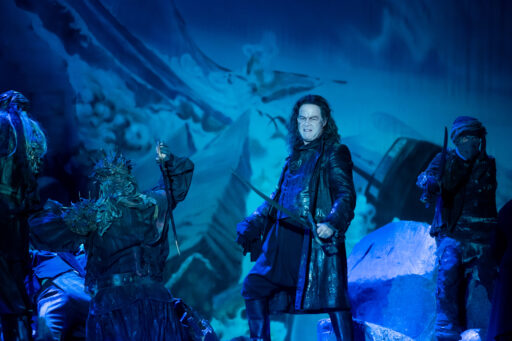 After the dispute with Erik who shows up as a book-keeper with sleeve guards rather than a hunter, Daland does not enter with the Dutchman but Senta’s fiancé, an elderly man with a hat and walking stick. The painting opens again to show the same room, a stage on stage where we see the Dutchman with the young Senta. What seems to be a great effect at first does not make the duet work very well between Senta and the Dutchman who sing separately on the two levels of the scene.
After the dispute with Erik who shows up as a book-keeper with sleeve guards rather than a hunter, Daland does not enter with the Dutchman but Senta’s fiancé, an elderly man with a hat and walking stick. The painting opens again to show the same room, a stage on stage where we see the Dutchman with the young Senta. What seems to be a great effect at first does not make the duet work very well between Senta and the Dutchman who sing separately on the two levels of the scene. 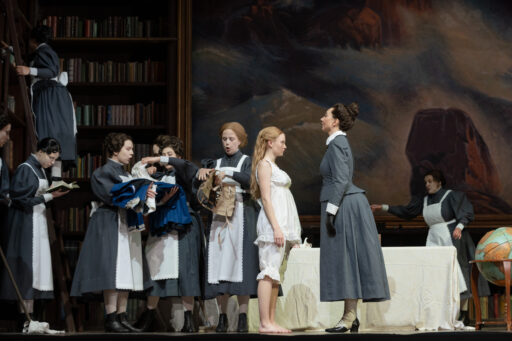 The third act starts with the wedding party. Senta and her husband got drunk and have fallen asleep. The guests are trying to wake them up instead of the traditional Norwegian sailor chorus versus the Dutchman’s crew. Senta awakens to kill her husband with a bottle, beat Erik with it, and finally cut her throat with a broken piece of it. The painting has opened up for the last time to show young Senta and the Dutchman on the deck of his ship with a dungeon that houses the former unfaithful wives, undead like the Dutchman himself. The scene does not support the idea of the Dutchman’s redemption at all which Wagner’s drama explains in the leitmotif. Just by listening to the music, everybody can normally imagine what is happening on stage. But the musical performance has also left me with mixed feelings, not only due to the somewhat phlegmatic conducting by Matthias Pintscher, at least at the beginning when the Staatskapelle Berlin needed time to get going.
The third act starts with the wedding party. Senta and her husband got drunk and have fallen asleep. The guests are trying to wake them up instead of the traditional Norwegian sailor chorus versus the Dutchman’s crew. Senta awakens to kill her husband with a bottle, beat Erik with it, and finally cut her throat with a broken piece of it. The painting has opened up for the last time to show young Senta and the Dutchman on the deck of his ship with a dungeon that houses the former unfaithful wives, undead like the Dutchman himself. The scene does not support the idea of the Dutchman’s redemption at all which Wagner’s drama explains in the leitmotif. Just by listening to the music, everybody can normally imagine what is happening on stage. But the musical performance has also left me with mixed feelings, not only due to the somewhat phlegmatic conducting by Matthias Pintscher, at least at the beginning when the Staatskapelle Berlin needed time to get going. 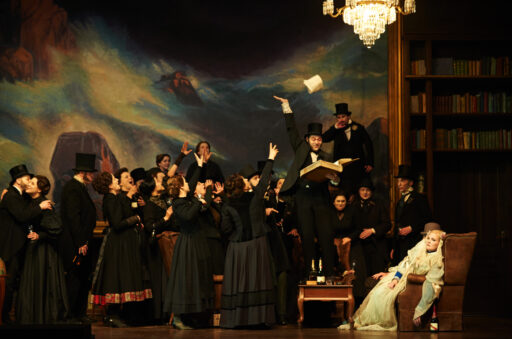 Gerald Finley as Dutchman simply transforms the assets of singing Mozart and Italian roles to Wagner’s vocal requirements to come out on top of the singers. Vida Mikneviciute has starred in parts by Wagner and Strauss with her distinctive timbre and beautiful vibrato. She delivers Senta’s ballad well-balanced between lyrical and enthusiastic moments.
Gerald Finley as Dutchman simply transforms the assets of singing Mozart and Italian roles to Wagner’s vocal requirements to come out on top of the singers. Vida Mikneviciute has starred in parts by Wagner and Strauss with her distinctive timbre and beautiful vibrato. She delivers Senta’s ballad well-balanced between lyrical and enthusiastic moments.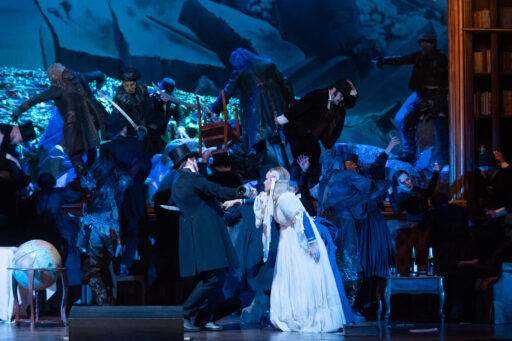 What a great start which unfortunately turns into some disappointment about the climactic notes which she falls short of at the end of the second act and in the finale. I hope it is due to an indisposition rather than a serious vocal shortcoming. Frau Mary is luxuriously cast by Marina Prudenskaya but largely ignored by the production. The part of Senta’s father Daland suffers from the little striking bass of Jan Martiník. Stanislas de Barbeyrac is vocally struggling, which quite coincides with the character of Erik. Daland’s ö is sung by Magnus Dietrich who stands out with a fine tenor and an impeccable diction. The Staatsopernchor led by Martin Wright proves first-rate in the demanding chorus scenes. Photo Jakob Tillmann
What a great start which unfortunately turns into some disappointment about the climactic notes which she falls short of at the end of the second act and in the finale. I hope it is due to an indisposition rather than a serious vocal shortcoming. Frau Mary is luxuriously cast by Marina Prudenskaya but largely ignored by the production. The part of Senta’s father Daland suffers from the little striking bass of Jan Martiník. Stanislas de Barbeyrac is vocally struggling, which quite coincides with the character of Erik. Daland’s ö is sung by Magnus Dietrich who stands out with a fine tenor and an impeccable diction. The Staatsopernchor led by Martin Wright proves first-rate in the demanding chorus scenes. Photo Jakob Tillmann
Deutsche Staatsoper Berlin: “Der fliegende Höllander”
